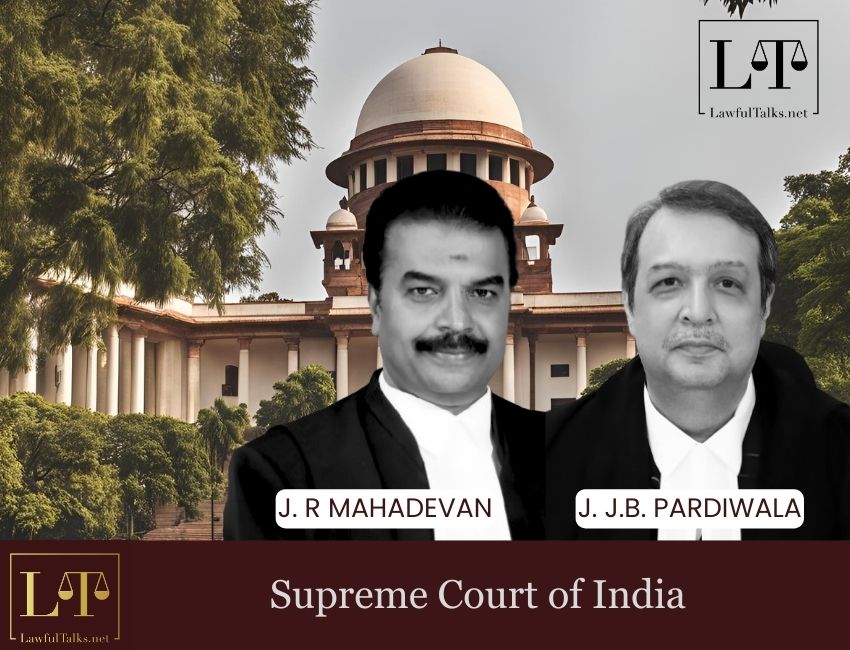Allahabad HC Sets Aside Afzal Ansari's Conviction, Allows Him to Continue as MP

The Supreme Court of India has delivered a significant judgment aimed at eradicating unauthorized constructions and promoting accountability in urban planning. The judgement, rendered by Justice J.B. Pardiwala and Justice R. Mahadevan, provides directives in Re: Directions in the matter of demolition of structures.

The case originated from an appeal against the Allahabad High Court’s order mandating the demolition of unauthorized commercial structures erected on a residential plot in Meerut, Uttar Pradesh. The appellants, who had purchased the commercial shops from the original allottee, argued for regularization of the structures on the grounds of prolonged occupancy and alleged administrative lapses.
The property in question was originally allotted to Respondent No. 5 by the U.P. Housing and Development Board (Respondent No. 1) under a scheme designed for residential purposes. Despite this, Respondent No. 5, in collaboration with Respondent No. 6, initiated commercial construction on the property without obtaining necessary approvals. Notices issued to halt the unauthorized construction were ignored, compelling the competent authority to pass a demolition order in 2011. However, due to inadequate enforcement and alleged collusion between local authorities and violators, the illegal structures remained.
The appellants contended that they were bona fide purchasers who had invested substantial sums in acquiring the shops. They claimed ignorance of the illegality at the time of purchase and argued that the structures had existed for over two decades without interference. They also alleged a "pick-and-choose" approach by the authorities, pointing out similar violations in the vicinity that had not faced action.
Rejecting these arguments, the Supreme Court emphasized that illegality is incurable and upheld the High Court’s demolition order. It ruled that the passage of time, financial investments, and administrative inaction do not legitimize unauthorized constructions. The Court observed:
"The lapses on the part of the authorities will not vest any person with a right to put up construction without planning approval and in violation of the conditions regarding usage.”
“There cannot be any estoppel against the law.”
The bench criticized the failure of regulatory authorities, stating that their negligence had emboldened violators and compromised the integrity of urban planning. It held that allowing such structures to stand would undermine public trust in the enforcement of laws and incentivize further violations.
To curb unauthorized constructions and enforce urban planning norms, the Court issued directives in Re: Directions in the matter of demolition of structures:
- Mandatory Undertaking: Builders must provide an undertaking confirming that possession of buildings will only be handed over to buyers after obtaining valid completion or occupation certificates.
- Display of Plans: A copy of the approved building plan must be prominently displayed at the construction site throughout the construction period.
- Regular Inspections: Authorities are required to conduct periodic inspections to ensure compliance with sanctioned plans. Completion and occupation certificates should only be issued after strict verification.
- Necessary Service Connections: Essential services such as electricity, water supply, and sewerage connections shall only be provided upon the production of valid completion or occupation certificates.
- Post-Completion Action: Any deviations identified after the issuance of completion certificates must be rectified immediately, with action taken against violators.
- Business Licenses Restricted: No trade or business licenses will be issued for operations conducted in unauthorized constructions.
- Zonal Plan Adherence:Development must strictly conform to zonal plans, and any modifications must be in line with public interest and environmental sustainability.
- Interdepartmental Cooperation: Authorities must collaborate across departments to enforce demolition orders promptly, with non-cooperation resulting in strict disciplinary actions.
- Expedited Appeals: Appeals and applications related to unauthorized constructions must be resolved within a statutory timeframe of 90 days.
- Accountability for Violations: States and Union Territories must circulate these guidelines, warning of contempt proceedings and legal actions for non-compliance.
- Financial Sanctions: Banks and financial institutions must approve loans against properties only after verifying valid completion or occupation certificates.
- Contempt Proceedings: Violations of these directives will lead to contempt of court proceedings in addition to prosecutions under relevant laws.
The judgment drew heavily from past Supreme Court rulings K. Ramadas Shenoy v. Chief Officers, Town Municipal Council, Dr. G.N. Khajuria v. Delhi Development Authority and Kerala State Coastal Zone Management Authority v. Maradu Municipality. These precedents collectively affirmed the judiciary’s firm stance against violations of statutory regulations.
Recognizing the administrative failures that allowed unauthorized constructions to proliferate, the Supreme Court directed stringent measures to hold officials accountable. Disciplinary and criminal proceedings were ordered against those who facilitated such violations, emphasizing that no individual, whether an official or a private developer, should be allowed to flout the law with impunity.
Additionally, the judgment mandated the circulation of its directives to all State and Union Territory governments, High Courts, and local bodies. It called for the issuance of circulars to ensure widespread compliance and warned that any deviation from these guidelines could result in contempt proceedings.
Case Details- Rajendra Kumar Barjatiya and Anr. V. U.P. Avas Evam Vikas Parishad (Civil Appeal No. 14604 OF 2024)
Advocates For Petitioner(s) Mr. Jitendra Mohan Sharma, Sr. Adv. Mr. Ajit Sharma, AOR Mr. Amrit Pradhan, Adv. Mr. Akshat Sharma, Adv. Mr. Durgesh Kumar, Adv. Mr. Sandeep Singh, Adv. Mr. Sanchit Garga, Adv. Mr. Pahlad Singh Sharma, AOR
Advocates For Respondent(s) Mr. Vishwajit Singh, Sr. Adv. Mr. Abhishek Kumar Singh, AOR Mr. Pankaj Singh, Adv. Mr. S. Singh,Adv. Ms. Ridhima Singh, Adv. Ms. Anamika Yadav, Adv. Mr. S. R. Singh, Sr. Adv. Mr. Rajeev Kumar Dubey, Adv. Mr. Ashiwan Mishra, Adv. Mr. Kamlendra Mishra, AOR Mr. Pahlad Singh Sharma, AOR



































































































































































































































































































































































































































































































































































































































































































